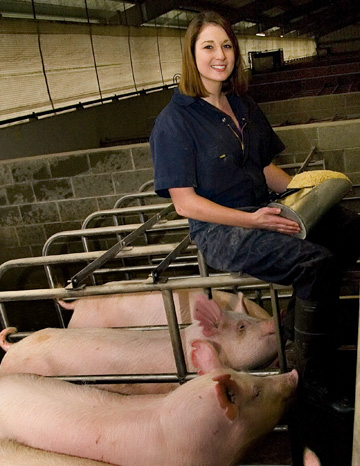Volume 25 · Number 3 · Spring 2008
Dirty Work and Dream Jobs: Amanda Plunkett

(Photo: Karin Higgins/UC Davis)
Senior in animal science and management from Vacaville
Job: Student herdsman at the Swine Teaching, Research and Extension Center
Helping to breed and raise hundreds of pigs is a big job — and not for the faint of heart . . . or nose. Duties include feeding, vaccinating, collecting boar semen, artificially inseminating the females and, after the piglets are born, notching their ears, clipping their tails, teeth and umbilical cords, and castrating males not selected to become breeders. But Amanda Plunkett, an aspiring livestock veterinarian, says she enjoys the responsibilities of the live-in position. She and three other students work with Manager Kent Parker in running the center. “I like this because I get to work with animals,” Plunkett says. “I get to work with people. I get to learn something new all the time. And I get to contribute my knowledge and opinions to facility decisions.”
Living at the hog barn: When Plunkett invites friends over for the first time, the response is usually: “You live where?!” She shares a room with another self-described “pork princess” in a separate wing of the swine center about two miles west of the central campus. The center opened in 2000 to replace UC Davis’ 1913 wooden hog barn, which was moved next to the Silo where it awaits renovation as office space. Nights at the new facility tend to be quiet, Plunkett says, in contrast to mornings when she makes her feeding and pen-cleaning rounds. Then a deafening chorus of squeals, grunts, snorts and other pig sounds greet her as she doles out their beloved mixture of corn and soybean meal.
About that smell: The powerful odor emanating from the hog barn comes from the feed, not the hogs, Plunkett says. “A common misconception is that pigs are very dirty, and they are not. They’re very clean animals. They love water.” Many of the pigs learn to relieve themselves in a shallow channel that gets regularly flushed by an automated system. The pig-feed smell, however, tends to cling. Plunkett showers before her classes and sometimes takes a second shower later in the day. “It depends on which job I’m going to next,” says Plunkett, who also works part time at the California Animal Health and Food Safety Laboratory on campus and for a Davis dairy veterinarian.
Pigs vs. sheep: Plunkett grew up raising sheep and other livestock for 4-H and Future Farmers of America projects. She also spent two years working at the campus sheep barn. This is her first time working with pigs. “They have a lot personality. I think they’re the most intelligent livestock I’ve ever worked with.” Hours are better at the hog barn, where her twice-a-week morning shift starts at 8 a.m. Nursing sows get an extra feeding in the evenings, but that’s easy compared to lambing season, when she had to check on pregnant ewes every two hours from midnight to 6 a.m. “No night checks, yeah! I can sleep all night.”
« Back to Dirty Work and Dream Jobs
